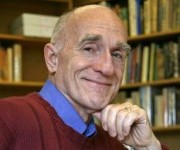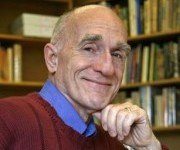 Scott Russell Sanders, author of A Conservationist ManifestoCourtesy of Indiana University PressI’ve had some great teachers over the years, but none quite like Scott Russell Sanders, the gentle guru of Bloomington, Indiana, and a leading light of Midwestern environmentalism. To call him articulate doesn’t begin to do justice. He exudes a sort of intellectual clarity, in both his works of non-fiction and fiction and in his teaching at Indiana University. (As a former student, I’m a thoroughly biased source.)
Scott Russell Sanders, author of A Conservationist ManifestoCourtesy of Indiana University PressI’ve had some great teachers over the years, but none quite like Scott Russell Sanders, the gentle guru of Bloomington, Indiana, and a leading light of Midwestern environmentalism. To call him articulate doesn’t begin to do justice. He exudes a sort of intellectual clarity, in both his works of non-fiction and fiction and in his teaching at Indiana University. (As a former student, I’m a thoroughly biased source.)
Sanders’ book Staying Put offers a countercultural vision of what it means to live rooted in a place — not far from Wendell Berry country, geographically or philosophically. A Private History of Awe charts his development-of-conscience growing up on a military base during the civil rights and Vietnam eras. It’s one of the best memoirs I’ve ever read.
His new book, A Conservationist Manifesto (released this week), presents a host of arguments for why we’re better off thinking of ourselves as citizens and stewards than consumers in the face of ecological disaster. Here’s our recent phone conversation about the book.
Q. What led you to write A Conservationist Manifesto?
A. For the first time in human history, we are causing damage to the entire living system of the planet, and we know that we are doing so. We don’t have models for how to respond, because none of our ancestors ever had to contend with damage on this scale. I’m trying to identify some of the sources we possess within our spiritual and intellectual traditions, and within science and art, for responding in creative ways to our present environmental predicament.
Q. You do a lot of describing a civic “good life” — through describing what you love best about Bloomington, through describing the work of unsung conservationists, and in your essay that responds to [James Howard] Kunstler’s Geography of Nowhere with a “Geography of Somewhere.” Why do you take this on?
A. We live in a society that places so much emphasis on private wealth that we forget how important the common wealth—the realm of shared natural and cultural goods–is for our happiness, our wholeness, and our well-being. Advertising addresses the isolated individual, but we don’t exist in isolation. We exist as members of relationships, within families, communities, neighborhoods, and workplaces. I write about that communal dimension of our existence because the private dimension is more than adequately dealt with by the popular media.
Q. Sure. It seems like an artistic challenge as well to make successful towns and societies as compelling as dysfunctional ones.
A. None of us wants to live in the midst of trouble, but we do want to read about it and watch it on screen. It’s easier to make trouble and failure artistically captivating. So there is this paradox. I faced a similar challenge in my book A Private History of Awe, where I wrote about an enduring and loving marriage. It’s a lot harder to engage people in reading about something that works well over a long period of time than to engage them with something that breaks down in catastrophic and sensational ways.
Most environmental news describes breakdown of one sort or another. Of course, it’s crucial for us to be aware of such news. At the same time, we need to know about the creative and promising responses that people are making, the various “arks” people are building to carry what we love and what we need through this time of troubles.
Q. You write about settling in southern Indiana in 1971 and trying to be a conscientious citizen since then. How have you seen the environmental movement, or attitudes toward conservation, change in the Midwest over that time?
A. During my nearly 40 years here in southern Indiana I have seen a rising concern about the preservation of forests, the restoration of wetlands, the cleansing of rivers, and the healing of communities. As I travel around the Midwest, I meet people everywhere who are involved with farmers’ markets, with land trusts, with community-supported agriculture, with schoolyard gardens, and with other efforts to protect and restore portions of the natural world. Every community I visit has organizations devoted to looking after the land and waters, fostering organic gardening, reducing carbon emissions, or other environmental causes. I find that very encouraging.
The central section of A Conservationist Manifesto focuses on Indiana, because this is the place I know most deeply. For the benefit of readers who live elsewhere and who may think of the Midwest as short on wild beauty and environmental consciousness, I wish to call attention to the natural history of my home region and to the conservation efforts underway here.
Q. Your vision about how we ought to live in relation to the natural world stands very much in the tradition of Henry Thoreau, John Muir, Wendell Berry, Annie Dillard, Rachel Carson, Aldo Leopold, and such. And you make it pretty clear in your writing that you’re working from within that tradition. I’m curious about how you make your message your own.
A. Well, certainly I have drawn on the great tradition of American nature writing, and I honor those predecessors. But I also feel that I’m doing something different. That tradition was created primarily by men who explored nature in solitude. They made excursions into the natural world, lived beside ponds or climbed trees in the midst of storms or canoed wild rivers, and then returned to write about the experience. I treasure their work. But I am not solitary. I write about living in the midst of family, community, and human structures. I see the natural world not as a wild place out there, but as the matrix from which we arise and in which we dwell. We breathe it, drink it, eat it, and wear it; we are sustained by nature with every heartbeat.
Among our contemporaries, Wendell Berry and Gary Snyder, in particular, have written powerfully about human relationships embedded within nature. They exemplify the sort of writer I’ve tried to be, more fully than such earlier figures as Thoreau or Muir.
Q. I want to ask about reverence and irreverence. You make a case for sort of rediscovering reverence–in dealing with the natural world, in dealing with other humans — Grist tries to make a case for irreverence in approaching deadly serious topics. What gives?
A. Reverence is a profoundly important attitude. Not toward ourselves or our work, but toward the power that we see manifest in the natural world and that we feel moving within us. Reverence toward that shaping power seems to me the deepest and truest emotion the universe calls for. That awareness runs through A Private History of Awe, as well as A Conservationist Manifesto. We need to recover a sense of the ultimate value and beauty of wildness, including the wildness that courses through us as human beings.
While we honor the universe, we need to maintain a healthy irreverence toward ourselves. We need to challenge, to question, in some cases to mock, to look harder at our works, postures, and sayings. Grist has attracted readers who might be put off by the sense of frenzy and righteousness that can creep into environmental writing (including my own). So that’s where irreverence comes in.
Q. What do you make of the so-called “moderate” Congressional Democrats, ones like Indiana Sen. Evan Bayh, your representative, Baron Hill, and others who have suggested they may force Obama to slow down or water down renewable energy measures and capping carbon emissions? What do you think of the whole “moderate” or “centrist” terminology?
A. They’re not moderate, nor centrist, nor conservative. Insofar as they are endorsing the status quo, which is ruining the planet, they are extremists. They refuse to recognize how radically our society needs to change. They seem to feel that we can cope with global-scale damage by making little changes around the edges of our lives. They’re not moderate; they’re timid. We need more courage and vision from all of our leaders, at the local, state, and national levels, and we need those qualities from Republicans as well as Democrats.
The word “conservative” ought to have some connection to the word “conserve.” If you’re going to call yourself conservative, you ought to be clear about what it is you want to conserve. Many conservatives, if they’re honest, will say, “I want to conserve as much money as possible in private hands, and I want to protect every opportunity to increase that private wealth, regardless of the cost to society or planet.” If we keep treating the accumulation of money by individuals and corporations as the highest good, we will continue to degrade Earth’s living systems, and we will leave a sadly diminished world for future generations. That’s as immoral a path as I can imagine.
Q. Thanks. What have I missed?
A. Some people come across A Conservationist Manifesto and say, “That title seems confrontational.” Maybe it is, I reply, but so is every billboard, every TV advertisement, every speech calling for endless growth, every Hummer on the highway, every assault on the Endangered Species Act, every call for drilling in wildlife refuges. If we plead, “Don’t forget that we share the planet with millions of other species, that we are degrading the living conditions for all beings including ourselves, that we are betraying future generations”—if we say all of that mildly and meekly, we have no chance of being heard in our cultural cacophony. We need to be forceful in challenging the ruinous path we’re on and the media and ideology that keep pushing us along that path. I hope that A Conservationist Manifesto is written in a measured, thoughtful, lucid way. But I also hope the book conveys a sense of ethical and practical urgency. Right now, anything less than urgency is inadequate to our situation.



